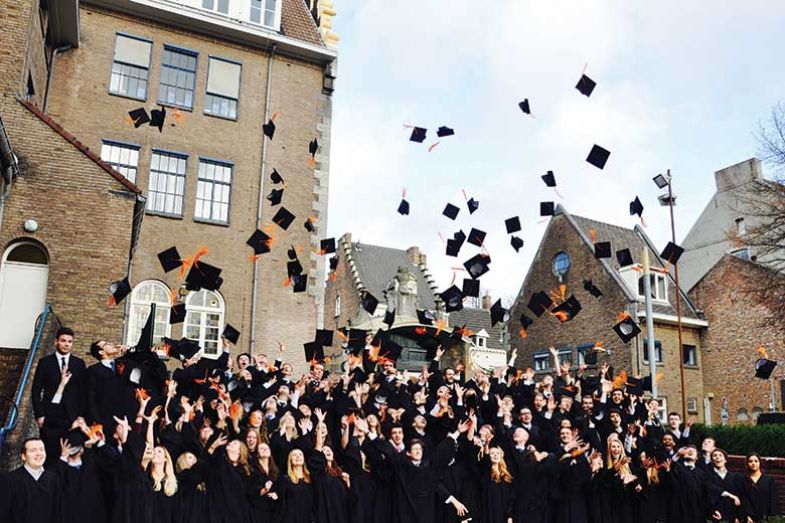
Source:
HSBC

Learn more here about how HSBC can help
US colleges can help their international students manage a new culture, homesickness, stress and mental health issues
New thinking about technology and networks, both on and off campus, can better enable international students’ academic success and well-being, according to a report from HSBC. The findings of its recent research began a roundtable discussion held in partnership with Times Higher Education as part of THE’s inaugural US Student Success Forum.
Higher education leaders from New York-area colleges were invited to discuss and debate how their institutions address the challenges that international students face when they travel abroad to study, such as homesickness and financial strain.
Panellists took the opportunity to share their professional insights and to expand upon HSBC’s findings, which evaluated what international students think about their overseas educational experiences. Paul Mullins, regional head of international North America Retail Banking and Wealth Management at HSBC, explained that HSBC shaped its survey to focus on the perspectives of international students to gain new understandings of the issues that they both face. “What we found was critical, because it has a direct bearing on students’ ability to focus on their education,” he said. “We found, for instance, that a third of the respondents said homesickness caused them to become more insular and not participate in extracurricular activities, which we’ve seen are so important for student success.”
Technology has made it considerably easier for international students to stay in touch with loved ones back at home, according to Karen Pennington, vice-president, student development and campus life at Montclair State University. “Thanks to phones and apps like WhatsApp and FaceTime, the disconnect or the impact of being away is a lot less than it used to be,” she said. The remedy has its limits, though, she added, because “students who attend schools away from an urban setting where there are no subways, buses or taxis to get around off-campus… can have an isolating experience, which leads to homesickness.”
“Getting international students off to the right start really matters,” said Bernie Savarese, assistant vice-president at New York University’s student success office. One solution at NYU has been to require that international students are housed with a roommate from the US.
Panel participants agreed that finances are another source of stress for students, an observation in line with findings from the HSBC report. “Themes we hear over and over at our New York and Vancouver campuses revolve around managing life, finances and work,” said Junius J. Gonzalez, provost and vice-president of the New York Institute of Technology. “Regulatory challenges international students face in getting part-time work or work experience is one example. Another is the fact that there is no housing in high-price cities like New York and Vancouver adds a big, big stress to everything a student has to do.”
Today’s tumultuous political backdrop is yet another worry for many current international students. “We can’t discount how harrowing things are in a highly volatile time,” said Mary Erina Driscoll, dean of education at CUNY City College of New York. “We’re encountering a whole new level of stress with students worry about leaving to go home and not being able to come back.”
“There’s a real risk that the rise of nationalism worldwide is going to put a damper on international study,” added Gregory M. Britton, editor-director of the Johns Hopkins University Press.
Adapting to a new culture can be obstacle, too. International students are confronted with a number of challenges starting with acclimatising to differences in how they socialise, study or seek the help that they need. “Often international students come across a learning curve when it comes to things such as class participation and the hierarchy involved with asking questions or addressing professors,” said Nada Marie Anid, vice-president for strategic communications and external affairs at the New York Institute of Technology. “These are cultural matters and sometimes you have to actively encourage international students to ask questions in class,” she said.
Several panel members underscored the importance of providing international students with mental health resources and counselling to deal with the pressures that they encounter. The problem is that even when universities devote more attention and money to mental health services, cultural issues can cause them problems. Often international students find it difficult to seek help. “There is a stigma surrounding mental health issues for a student from China that is completely different for a student from the Bronx in New York City,” said Nariman Farvardin, president of the Stephens Institute of Technology.
“We have a system that makes students come to us to seek help, and that’s a problem,” added Adelphi University provost, Steve Everett. Farvardin said that Stephens has hired a counselor who is fluent in Mandarin to work in the college’s mental health office as one way to put Chinese students more at ease.
Here, technology may offer yet another solution. Everett cited a recent study at Dartmouth College, where student volunteers allowed researchers to gather data from smart devices such as Apple watches and Fitbits. Once the information was collected and analysed, researchers discovered patterns. Student activity levels were high at the start of semesters, a period when the university organised a lot of events. At the start of mid-term examinations, however, students slowed down, exercised and interacted less, drank more and sought counselling. Using the information gathered, Dartmouth could then plan events to counter the trend.
Savarese said that NYU is starting to examine the ways that it can similarly gather and disseminate information to intervene and help students in need before a crisis starts. “We’re looking to leverage software and tech to see how an office like ours can bring together data to be more proactive. That might include swipe card or engagement data, academic records, or even notes from advising and financial aid to give us more predictive power to identify trends.”
Perhaps the most positive takeaway from the roundtable discussion was that, in hindsight, international students are convinced of the benefits of studying abroad. More than 80 per cent of the HSBC’s respondents said that they gained skills, broadened their mindset and came out a stronger person for the experience. “Students overwhelmingly agree that study abroad has a lasting, positive impact,” said Mullins.
The panel
Paul Basken, North America editor, Time Higher Education (co-chair)
Paul Mullins, regional head of international North America retail banking and wealth management, HSBC (co-chair)
Nada Marie Anid, vice-president, strategic communications and external affairs, New York Institute of Technology
Gregory M. Britton, editorial director, Johns Hopkins University Press
John M. Burdick, associate director of student success, New York University
Mary Erina Driscoll, dean of education, CUNY City College of New York
Steve Everett, provost and executive vice-president, Adelphi University
Nariman Farvardin, president, Stevens Institute of Technology
Junius J. Gonzales, provost and vice-president, academic affairs, New York Institute of Technology
Shalini Guglani, senior vice president and Manhattan East area manager, HSBC
Whitney Hawkins, associate director of student success, New York University
Yuxiang Liu, director of institutional research and assessment, Yeshiva University
Tim Marshall, provost and chief academic officer, the New School
Karen Pennington, vice-president, student development and campus life, Montclair State University
Bernie Savarese, assistant vice-president for student success, New York University
Brought to you in conjunction with HSBC. Find out more about banking for international students.















